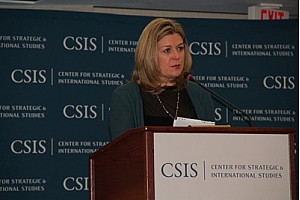Meridian and CSIS Hold an Event Looking at the Summit of Americas through the Lens of Inclusion
As a timely review of last month’s Summit of the Americas in Cartagena, Colombia, the Council on Women’s Leadership (CWL) at Meridian International Center and the Americas Program at the Center for Strategic and International Studies (CSIS) co-hosted an event on April 25th which looked at how the Summit addressed issues of social inclusion in the Americas as a path toward comprehensive economic and political progress. The panel discussion titled “Towards a More Inclusive Hemisphere: A Post-Summit Review,” featured Ambassador-at-Large for Global Women’s Issues Melanne Verveer and the U.S. Department of State’s Summit Coordinator John Feeley and Former Colombian Foreign Minister and Ambassador of Colombia to the United States Carolina Barco, who moderated the discussion. CWL Chair Michele Manatt and CSIS Americas Program Director Steve Johnson provided opening remarks.
Ms. Manatt highlighted the significance of having equality and inclusion at the center of this Summit given that inequity is the greatest obstacle to more sustained growth in the region of more than 900 million citizens. She pointed out that the Summit was attended by the heads of state of nearly all the democracies in the Western hemisphere, and was complemented by a CEO Forum organized by the Inter-American Development Bank. Ambassador Barco remarked on how the Summit leveraged an increasingly important and effective model for bringing together the government, private, and NGO sectors to collaborate on identifying solutions to the most important issues facing their countries. At the Cartagena Summit, one of the preeminent concerns identified by nations across the hemisphere was how to address issues of job creation, boosting productivity, and achieving better inclusion of women and indigenous groups.
Ambassador Verveer began by praising the Council on Women’s Leadership at Meridian for its work promoting the achievements of international women leaders and making women’s inclusion in public life a centerpiece of its mission. She went on to articulate the context for why issues of inclusion were central in this Summit: public and private sector leaders are recognizing that the most pronounced economic gains will only be possible by ensuring women’s economic participation. There is an increasing amount of research that shows that women’s participation in economic development has a multiplier effect for societies that result in significant investments in human infrastructure in areas such as health, education and access to technology. Ambassador Verveer also highlighted the launch of initiatives like WEAmericas (Women Entrepreneurs of the Americas) by U.S. Secretary of State Hillary Clinton, which are aimed at delivering business training, market knowledge, and access to capital.
John Feeley, the U.S. Coordinator for the Summit of the Americas and until recently the Deputy Chief of Mission at the U.S. Embassy in Mexico City, provided a wider view of what he saw as the most important outcomes from the Summit assessing it as “a win, a lose, and a draw.” He acknowledged that while the Secret Service prostitution scandal was a “tremendous disappointment,” it did not detract from the substance of the dialogue among the heads of state and ministers in Cartagena. Even though the parties did not reach full consensus on a final declaration, they had wide agreement on the themes of improving connectivity in the energy sector, mitigating and improving response to natural disasters, and matching policy changes to identified obstacles to social inclusion of all minority groups. Feeley, who has worked over 20 years in the region, opined that this is evidence of how much progress has been made and how the vestiges of the Cold War paradigm toward Latin America have vanished. The wins for Cartagena Summit according to Mr. Feeley were – Colombia’s successful showcasing of its tremendous progress as a regional leader that has ended an internal conflict; the CEO Forum of 700 participating corporations which was highly productive and provided an excellent model for future Summits, and that all the far-reaching initiatives announced during the Summit made concrete contributions to the most important theme for the advancement of women—social inclusion.
Project summary
| Meridian and CSIS Hold an Event Looking at the Summit of Americas through the Lens of Inclusion | April 2012 | |
|---|---|
| Regions: | Western Hemisphere |
| Impact Areas: | Empowering Women and Girls, Civic Engagement, Governance and Transparency, Business and Trade |
| Program Areas: | Diplomatic Engagement |
| Partners: | Private Sector, Public Sector, NGOs |
